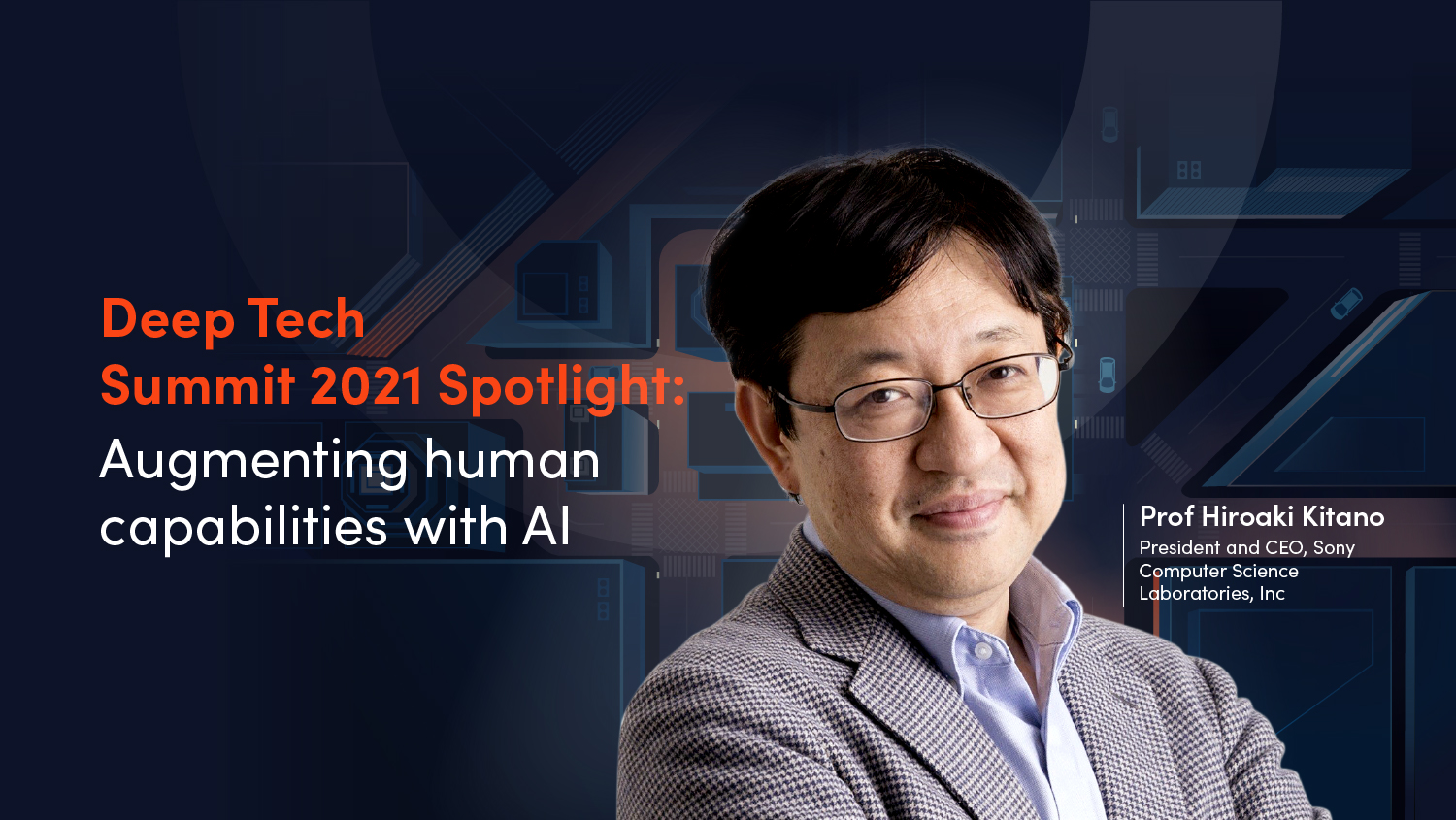Deep Tech Summit 2021 Spotlight: Augmenting human capabilities with AI
Wed, 11/03/2021 - 12:00
A conversation with Professor Hiroaki Kitano, President and CEO, Sony Computer Science Laboratories, Inc. Professor Kitano brings wide-ranging expertise from robotics to life sciences to lead the organisation’s vision to augment human imagination and creativity with AI. He will be speaking at the opening session of Deep Tech Summit 2021.
What do you think will be the greatest impact AI will bring to society? Please tell us more about Sony Computer Science Laboratories’ and Sony AI Inc.’s goals for the advancement of AI.
One area where AI has the potential to bring the greatest impact to society is in unleashing human creativity and imagination. This is also the mission of Sony AI.
Of course, AI can be used to save cost, replace repetitive human labour, etc., but for us, the most exciting uses of AI are in augmenting what we can do, and exploring new possibilities. For example, Sony Computer Science Laboratories’ (CSL) Flow Machine is an interactive music composition support environment where musicians can generate new melodies, chords, and basslines, either based on their own styles or other genres they’re hoping to explore. In this instance, AI doesn’t replace the human in composing music, but rather assists musicians in expanding their creativity.
Another example where we’re using AI to augment what we’re already doing is in Synecoculture, a novel agricultural approach, which endeavours to assist small-sized farms around the globe by helping them build and maintain high-biodiversity agricultural micro-ecosystems beyond the natural environment with 100-200 crop species.
The abilities of AI can also be demonstrated within scientific research itself. The Nobel Turing Challenge aims to develop a highly autonomous AI system that can perform top-level science, indistinguishable from the quality of that performed by the best human scientists. What these ‘AI scientists’ create may not resemble or replace the scientific process conducted by human scientists, but could give rise to a human-AI hybrid form of science that transcends current human cognitive limitations and sociological constraints.
Your research background covers many fields, from particle physics to AI to bioscience. How have your experiences shaped your philosophy as CEO and an AI industry leader?
The power of AI is best amplified and materialised in specific domains such as biomedical sciences, engineering designs, etc., so this in-depth experience in multiple fields helps me a lot in understanding the specific issues that are faced in each field, as well as recognising commonalities of the problems and solutions.
What does ‘Deep Tech’ mean to you? What areas of Deep Tech are you most excited to see being explored further in the next decade?
Life science and sustainability are the two most interesting areas for me. In biomedical science, longevity is a major challenge related to immunology, infectious diseases, reproductive medicine and regenerative medicine. We are entering a new era in biomedical sciences, and AI and other Deep Tech applications will play a critical role in advancing this field.
Sustainability, which includes biodiversity, energy, waste, resource demands, food, etc is also a huge issue we’re tackling globally today. At Sony CSL, we approach this through innovations in energy and agriculture, such as our Open Energy System, a distributed microgrid, and Synecoculture.
What are some of the roadblocks today that limit the potential of Deep Tech?
I don’t think there are major roadblocks that will hinder the potential of Deep Tech. Deep Tech will likely continue to grow in importance in our society.
What would an ideal human-machine symbiotic future look like to you?
If we consider the extreme, that would mean a new civilisation where machines evolve themselves in a way that affects our society, and eventually lead to a new steady state. How we augment our capabilities and transform as a civilisation is critical. Can we become more sustainable as a civilisation? That is the question that needs to be addressed.
Professor Hiroraki Kitano will be sharing more of his thoughts at the opening session of Deep Tech Summit 2021: Deep Tech in 2050. Be part of the conversations shaping the future of Deep Tech here.
Trending Posts
- From satellites to startups, Singapore’s space sector is pushing new frontiers
- How leaders should rethink cybersecurity strategy
- How to Future-Proof a Career in Deep Tech? Start here.
- The future of fusion energy: What will it take to bring the power of the stars to earth?
- Keeping satellites safe: How CYSAT Asia 2026 is tackling space cybersecurity






